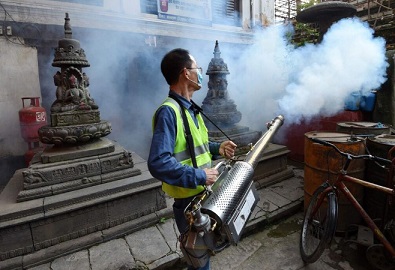Nepal That Has A Cool Climate Is Witnessing A Surge In Dengue With An Average Of 50 Infections Per Week At Present!
Nikhil Prasad Fact checked by:Thailand Medical News Team May 18, 2024 11 months, 1 week, 12 hours, 24 minutes ago
Dengue News: Nepal, a country known for its cool climate and stunning mountainous landscapes, is currently grappling with an unusual and alarming health crisis. As pre-monsoon rains intensify, the nation is witnessing a significant surge in dengue infections, with an average of 50 new cases reported each week. The conditions for a potential outbreak are rapidly aligning, and health experts are raising concerns about the situation escalating further.
 Nepal Witnessing A Surge In Dengue
Pic Credit: Prakash Mathema/AFP
The Perfect Storm: Water and Warmth
Nepal Witnessing A Surge In Dengue
Pic Credit: Prakash Mathema/AFP
The Perfect Storm: Water and Warmth
"Dengue vectors are already there in many places across the country," Professor Murari Das, an entomologist at the BP Koirala Institute of Health Sciences told
Dengue News journalists. "With the right conditions like water and even slight increase in temperatures required for vector breeding available now, we can expect a spike in dengue cases in the coming days."
Dengue fever, a viral disease transmitted by female Aedes aegypti and Aedes albopictus mosquitoes, thrives in environments where stagnant water and warm temperatures coexist. According to the World Health Organization (WHO), these mosquitoes are also vectors for other serious diseases such as chikungunya, yellow fever, and the Zika virus.
The Epidemiology and Disease Control Division (EDCD) has reported cases of dengue in 57 districts, including the Kathmandu Valley's three major districts: Kathmandu, Lalitpur, and Bhaktapur. Dr Gokarna Dahal, chief of the Vector Control Section at the division, has noted that "on average, around 50 people across the country are becoming infected with the dengue virus every week. The number could rise in the coming days, as pre-monsoon rainfall activities have recently increased."
A Year-Round Threat
While the post-monsoon season is typically considered the peak transmission period for dengue, Nepal has been experiencing outbreaks throughout the year. This persistent presence of the virus has rendered the country endemic to dengue. Since the start of 2024, approximately 1,000 people have already been infected.
Public health experts caution that the reported cases likely represent only a fraction of the actual number of infections. Approximately 80% of people infected with dengue do not show symptoms, making the true scale of the problem difficult to gauge. Many individuals who do develop symptoms experience mild illness that can be managed at home with over-the-counter medications like paracetamol.
Last year, Nepal recorded at least 20 dengue-related deaths and over 52,000 infections, spanning all 77 districts. In 2022, the country saw 88 deaths and more than 54,000 cases, overwhelming hospitals and causing a shortage of paracetamol in pharmacies.
ds/news/pdf/657e90834a34c.pdf">https://edcd.gov.np/uploads/news/pdf/657e90834a34c.pdf
The situation in 2019 was similarly dire, with six fatalities and over 16,000 hospitalizations.
The Call for Preventive Measures
Given the current trajectory, experts are urging immediate preventive action to mitigate the risk of a massive outbreak. "This is the right time to prepare and prevent possible outbreaks in the coming days," said Professor Das. He emphasized that waiting for a full-scale outbreak would be too late. Authorities should launch awareness campaigns, enhance vector surveillance, and implement other preventive measures without delay.
Health Ministry officials have already issued warnings to relevant agencies about the looming risk. "We have alerted all relevant agencies about the risk of a dengue outbreak in the coming days," Dr Dahal confirmed. Some local units have begun awareness activities, and health agencies have been urged to adopt preventive measures, including launching comprehensive awareness drives.
The Endemic Challenge
Dengue has become an endemic disease in Nepal, with infections occurring year-round. Epidemiologists and virologists highlight that dengue is now a major public health issue in the country. Despite the high number of infections and fatalities, authorities have been criticized for their lackluster response to the crisis. Experts argue that counting infections and deaths is not enough; proactive measures are essential to control the spread.
Preventive measures like search-and-destroy operations and widespread public education campaigns are crucial. Dengue-transmitting mosquitoes breed in clean water and are active during daylight hours. Uncovered water tanks and discarded items like plastic cups and bottles serve as breeding grounds for these mosquitoes.
Recognizing Symptoms and Seeking Treatment
Symptoms of dengue include mild to high fever, severe muscle and joint pain, rashes, severe headaches, and pain behind the eyes. Doctors advise individuals exhibiting these symptoms to seek immediate medical attention. While there is no specific cure for dengue, early detection and proper medical care can significantly reduce the risk of severe complications and death.
As Nepal braces for the upcoming monsoon season, the urgent need for preventive measures and heightened awareness cannot be overstated. The health and safety of thousands depend on swift and effective action to combat the rising threat of dengue fever.
For the latest
Dengue News, keep on logging to Thailand Medical News.
